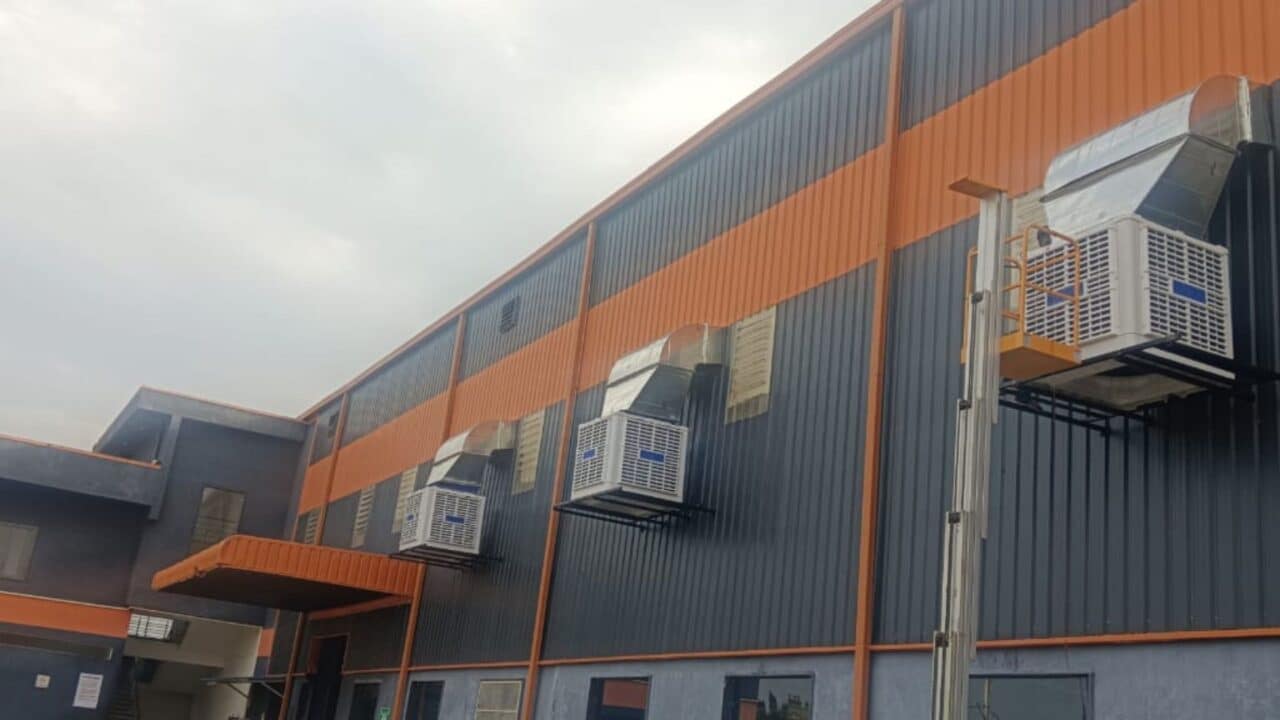When we think about industrial infrastructure, we often think about big machines, complex assembly lines, and large warehouses. But an unsung hero is working behind the scenes on HVAC systems. These systems don’t just keep things cool or warm; they help factories run smoothly, protect products, keep workers safe, and meet environmental rules. HVAC isn’t just about comfort; it is a key part of every modern industrial setup.

Why HVAC is Important in the Industrial Environment:
1. Safeguarding delicate machinery and procedures: Sensitive equipment abounds in modern industrial facilities, ranging from delicate electronic components and laboratory instruments to data servers and precision manufacturing tools. The operating temperature and humidity ranges of these machines are frequently limited.
2. Temperature Control: extremes Hot and cold can cause equipment to malfunction, shorten its lifespan, or even fail. By keeping temperatures steady, HVAC systems avoid freezing or overheating, which may seriously damage operations.
3. Humidity Regulation: High humidity can cause corrosion, short circuits, and the growth of mold, while low humidity can cause the discharge of static electricity, which is a major hazard for certain industries. HVAC reduces these risks by carefully controlling humidity levels.
4. Air Purity: Dust, fumes, volatile organic compounds (VOCs), and other airborne pollutants are frequently produced by industrial processes. These particles are eliminated by HVAC systems with sophisticated filtration (HEPA filters, activated carbon filters), safeguarding delicate equipment and guaranteeing product integrity, particularly in cleanroom settings crucial for the processing of food, semiconductors, and pharmaceuticals.
Read Now: Common Myths About Evaporative Cooling Systems
Ensuring Optimal Product Quality and Consistency
1. Pharmaceuticals: To prevent ingredient deterioration and guarantee the stability and effectiveness of drugs, strict temperature and humidity control are essential in pharmaceutical manufacturing.
2. Food and Beverage: To ensure food safety, avoid spoiling, and maintain freshness, certain temperatures must be maintained during the production, storage, and packaging processes.
3. Electronics Manufacturing: Microchips and other electronic components can be damaged by even small dust particles or minute temperature changes. The controlled environment required for precision manufacturing is created by the HVAC System
4. Automotive and Aerospace: For consistent finishes and the best material qualities, exact temperature and ventilation control are essential in painting booths and areas used to cure composite materials.
Enhancing Worker Safety and Productivity
1. Thermal Comfort: Extreme heat or cold can cause exhaustion, heat stress, and a loss of focus, which raises the possibility of mishaps. Because HVAC keeps temperatures comfortable, workers can concentrate on their work.
2. Odor Control: Businesses that handle chemicals or other strongly scented materials, efficient ventilation and air purification systems are essential for reduce offensive odors, enhance the working environment, and adhere to legal requirements.
Maximizing Energy Efficiency and Cost Savings
1. Optimized Operations: HVAC reduces equipment downtime and the requirement for expensive repairs or replacements by preserving optimal conditions.
2. Waste Reduction: In sectors where product quality is impacted by environmental control, efficient HVAC reduces waste from spoiling or flaws.
3. Smart Systems: Automation, sensors, and smart controls are frequently incorporated into advanced industrial HVAC systems. This enables demand-based ventilation, precise zone control, and integration with building management systems. This minimizes carbon emissions, lowers utility costs, and maximizes energy use.
4. Heat Recovery: A lot of industrial operations produce a lot of waste heat. In order to further increase efficiency, modern HVAC systems can integrate heat recovery units, which capture and reuse this energy to heat other areas or processes.
Read Now: Top Energy-Saving Tips for a More Efficient Commercial HVAC System
Meeting Regulatory Compliance and Sustainability Goals
1. Emissions Control: Facilities with HVAC systems that have specialized filtration and exhaust can meet strict air pollutant emission regulations.
2. Sustainability Initiatives: Advanced HVAC systems support a facility’s sustainability objectives and corporate social responsibility by maximizing energy consumption and potentially integrating renewable energy sources.
The Future of Industrial HVAC
1. Increased Integration with IoT and AI: Intelligent, self-optimizing HVAC systems that anticipate requirements and react accordingly.
2. Further Advancements in Energy Efficiency: Additional developments in energy efficiency include the increased use of advanced heat recovery technologies, geothermal HVAC, and variable refrigerant flow (VRF) systems.
3. Emphasis on Indoor Air Quality (IAQ): There is a growing priority on improving the general indoor environmental quality for human health and reducing airborne pathogens.
Read Now: Effective Ways to Improve Indoor Air Quality with Air Purifiers
4. Modular and Scalable Solutions: HVAC systems that are easy to expand and adjust to changing industrial needs are known as modular and scalable solutions.
In summary, HVAC in the industrial sector covers much more than just “heating and cooling.” It is a key element that supports the entire operational framework and guarantees sustainability, efficiency, quality, and safety. Investing in strong, intelligent, and well-maintained HVAC systems is not an option; rather, it is a crucial necessity for any modern industrial enterprise hoping to prosper in a competitive and regulated environment. It is, in fact, the unsung hero of contemporary industrial infrastructure.
Frequently Asked Questions
Industrial HVAC systems in India are designed to control temperature, humidity, and air quality in factories, warehouses, and manufacturing plants.
Industries such as pharmaceuticals, food processing, automotive, electronics manufacturing, textiles, chemicals, and warehousing require industrial HVAC systems to maintain controlled environments and meet quality and safety standards.
Industrial HVAC systems prevent overheating, moisture buildup, corrosion, and static discharge by maintaining stable temperature and humidity levels.
Yes. Energy-efficient HVAC systems reduce carbon emissions, integrate renewable technologies, and support IGBC and green building certification requirements.
Choose Degree Day Pvt. Ltd., with 26 years of proven experience in factory projects, deep local regulatory knowledge, custom engineering capabilities, and successful case studies across your region.

